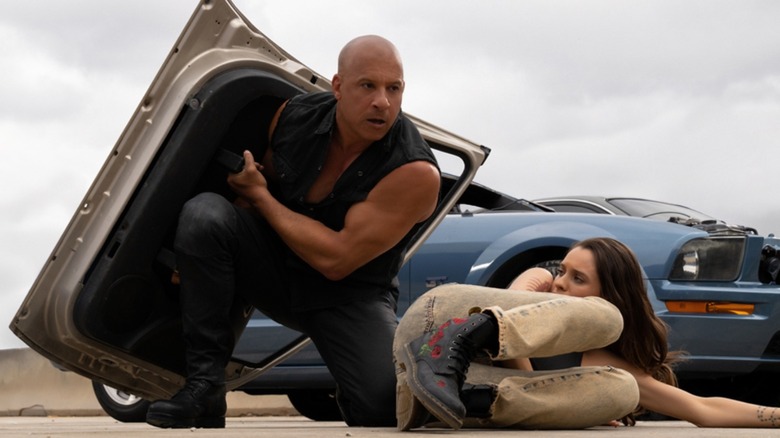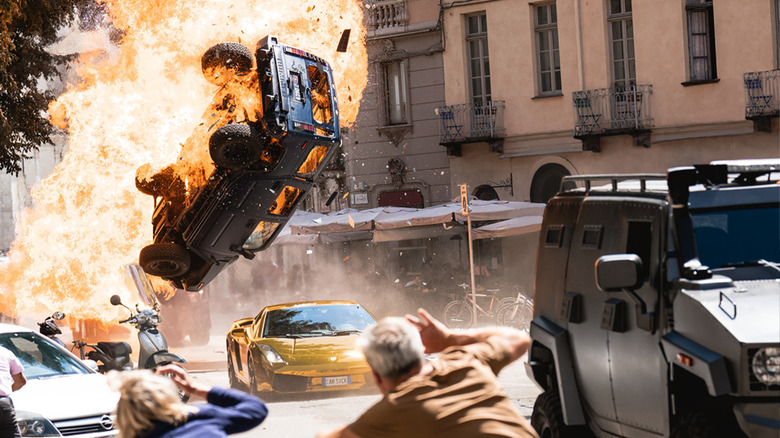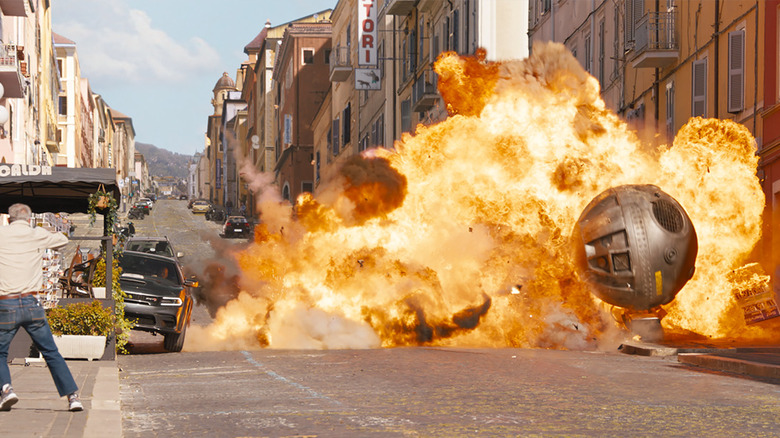The Fast And Furious Franchise Is Officially Worse At Killing Characters Than The MCU
Spoilers for "Fast X" follow.
Marvel Comics has long been notorious for dramatically killing off its star characters, only to resurrect them at a later date. Thanks to the byzantine machinations of superhero stories — Time travel! Parallel universes! Sorcerer's magic! Cosmic deities! Clones! — death has become resolutely impermanent for them. If anything, death is a mere inconvenience for a superhero, and they may just have to wait it out before an Infinity Stone or a time machine retrieves them from oblivion. One of the only Marvel characters that has stayed 100% dead in every iteration is Spider-Man's Uncle Ben. If Uncle Ben didn't die, then Spider-Man would not be motivated to become a superhero. And yes, there are some other minor Marvel characters who remain in the ground, but few miss, say, Thunderstrike.
Marvel's lack of death carried over into the Marvel Cinematic Universe in a rather disappointing way. While seeing Marvel heroes doing Marvel hero stuff was a thrill for a broad audience, there was a distinct feeling that the MCU filmmakers were holding back. They dared not kill off a beloved character and mess with the status quo. That meant that the stakes could only be raised so high. Even when half of the universe died out in a mystical cataclysm, they returned a few years later without too many openly discussed consequences. The Avengers witness death, then undo it. The characters themselves are all pretty much immortal.
The same is now true of the characters in the "Fast & Furious" film series. If a character appears dead, just wait a few movies. If you didn't see their body, audiences, then you didn't see death. At the end of "Fast X," everyone appears to be back.
The land without death
A world without death presents an issue when the filmmakers want to up the stakes or ratchet up the tension. At the end of "Fast X," Dom Toretto (Vin Diesel) finds himself in a tight spot, as he seemingly just witnessed the deaths of some notable other characters in the franchise. While the moment is dramatic, it seems that the filmmakers wouldn't have the temerity to actually kill off the characters. The thrill, it seems, will be finding out how the heroes escaped certain destruction, and not if they did.
This is a safe assumption to make, given how many characters have returned from death throughout the series. Letty (Michelle Rodriguez) was presumed dead only to return with amnesia. After being back with Dom for a bit, her amnesia was cured.
Han (Sung Kang) was infamously thought to have been killed in the third film, only to come back later (Han is in most of the "Fast & Furious" movies, despite his death). The only consequence of Han's death is that Shaw (Jason Statham) had tried to kill him in the past, and Han resents that. One might point to Gisele (Gal Gadot) as having been removed from the series, but one will find that "Fast X" contradicts them.
"Fast X" ends with the seeming deaths of several notable characters, and then leaves audiences hanging from a cliff. While one might be tempted to call the deaths shocking, we've all been trained too well to accept them as anything other than totally ephemeral. The stakes look like they might be high, but they are not. That presumption may eat into the film's credibility.
Facing real-life death
Heck, even in real life, death cannot change the status quo of the "Furious" movies. Actor Paul Walker, who appeared in the first seven movies, died in a car crash in 2013. But his "Fast & Furious" character, Brian, lives on. In the lore of the films, Brian merely retired from Dom's spy team to live his life in peace. "Furious 7" was still being made when Walker died, and was altered at the last minute to cover scenes that hadn't been finished, and to add a teary farewell to the beloved actor. "Furious 7" ended with Brian driving off into the sunset. Audiences mourned the actor, even if Brian was still perfectly okay. Even real death, it seems, cannot deter the togetherness of the "Furious" family.
Brian, incidentally, has been mentioned several times in subsequent sequels, including in "Fast X." He lives on somewhere, even if he's never on screen. One can hope the filmmakers display good taste and don't resurrect Walker via CGI.
In addition to all the resurrections, the "Furious" series also implied that its characters cannot die. In "F9," several characters note that they have escaped so many life-threatening scrapes that something might be up from a theological perspective. For a moment, they begin to think that they are literally unkillable, perhaps divinely protected. Had the "Furious" movies bothered to push their series directly into the arms of the supernatural, it would make perfect sense. The characters do not die because, well, they can't.
It would certainly add an interesting wrinkle to a series that already lacks death anyway.


